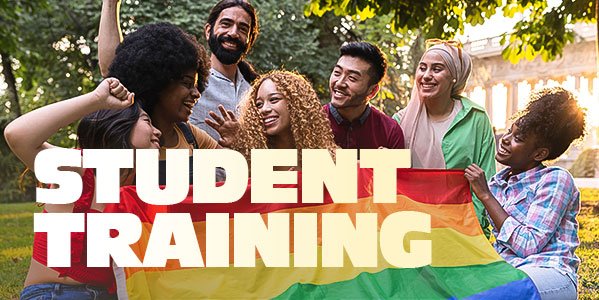|
|
 
Center on Halsted’s Behavioral Health Department offers clinical training opportunities for students completing their Masters or Doctorate in clinical psychology, counseling, or social work.
More information on the upcoming training year will be available in late November.
We approach training from a developmental model, as our cohort is typically diverse in terms of program and level of previous training. We do our best to meet trainees where they are and provide them with the tools and support they need to grow into behavioral health professionals. We look for students who value social justice and are looking for a training site that will ask them to bring their full selves to the work that they do and to engage in self-reflective learning, as these are values we hold as supervisors and professionals. We believe strongly in constructive feedback as an important element for growth, and we want students who are open to giving and receiving feedback with supervisors, staff, and their cohort members.
The Behavioral Health Department does not ascribe to any one theoretical orientation and encourages trainees to develop the clinical approach that feels most authentic to them. Staff members utilize a variety of theoretical approaches and interventions, and support trainees in exploring and practicing from different perspectives as they hone their clinical style. Our department strives to be trauma informed, strengths based, client centered, and LGBTQ competent with a focus on harm reduction in all our clinical interactions.
The Behavioral Health training program offers clinical training for students completing their Masters or Doctorate in a behavioral health field. Trainees in this program are supervised by clinicians in the Behavioral Health department and see clients with a wide range of presenting concerns. This is a great program for students who are interested in gaining a broad clinical experience within the LGBTQ community.
Direct Clinical Service:
Trainees will spend approximately 50% of their time in direct service with clients. This typically looks like a caseload of approximately 11 therapy clients, one group, and one intake per week. Trainees have the opportunity to work with clients across the lifespan (10 years of age and up) holding a wide variety of identities. While the majority of clients are seeking individual therapy, trainees may also be able to work with relationships and families.
Supervision:
Trainees meet with their primary supervisor (a LCSW or Licensed Clinical Psychologist) for one hour each week. During this time, trainees have the opportunity to discuss cases, professional development concerns, and their experience in the training program overall. In accordance with best practices in supervision, trainees complete a minimum of four audio recordings and four live observations each year. Trainees also attend weekly group supervision where they will give two case presentations during the year. In addition to structured supervision experiences, trainees are encouraged to consult with staff members as needed and both trainees and staff sit in cubicles, allowing for a milieu supervision experience.
LGBTQ Behavioral Health Training Consortium:
This weekly training meeting brings the trainees from Center on Halsted and Howard Brown Health together for didactic presentations on topics specific to working with the LGBTQ community. Some of the topics include intimate partner violence in LGBTQ relationships, substance use in the LGBTQ community, and kink in the LGBTQ community. These trainings are meant to help deepen and expand conversations around these and other topics, an opportunity that is often not offered in clinical training programs. Presenters are local clinicians who are considered experts in working with the LGBTQ community. The training consortium is also an excellent opportunity for trainees to network with students from other schools and disciplines, along with professionals working within the LGBTQ community.
Schedule:
Our trainees follow a 24-hour/week program, where schedules are created with as much flexibility as possible. Behavioral Health Services operates Monday through Thursday 9:00am–9:00pm and Friday 9:00am–6:00pm. Trainees are required to include one evening (until 9:00pm) in their schedule. In addition, trainees are required to attend weekly group supervision, support, and consortium meetings on Wednesdays from 1:00pm to 5:00pm. Students may revise their schedules each semester, as needed. Trainees will begin their training year in August with an orientation and will end their time with us at the end of May. During these 10 months trainees can expect to accrue approximately 800 hours.
The Behavioral Health training program accepts applications from the following:
- Students pursuing Doctoral degrees in clinical or counseling psychology at APA accredited programs seeking advanced placement.
- Second year social work graduate students attending CSWE accredited social work programs.
- Graduate students attending CACREP accredited counseling programs.
Students interested in applying should submit the following materials:
- Cover letter
- Resume or CV
- Three letters of reference
- Transcript
- Letter of readiness written by the Director of Training or Field Placement Liaison at your school. The letter should include that you are a student in good standing, you have completed the necessary coursework to allow you to do clinical work in the field, and that your school is in support of your intent to begin training.
Incomplete applications will not be reviewed. Please send applications to:
Ashley Molin, PsyD, Associate Director of Behavioral Health behavioralhealth@centeronhalsted.org
Confirmation of receipt of completed application will be provided via email. For additional information, contact Ashley Molin, PsyD at amolin@centeronhalsted.org or 773.472.6469 ext. 441.
Center on Halsted follows the guidelines set forth by the Association of Chicagoland Externship and Practicum Training (ACEPT) for Doctoral students. For more information about ACEPT, please visit their website at www.aceptchicago.org.
BACK TO TOP.
NEXT: COMMUNITY & CULTURAL
|

